2013 Holiday Email Marketing Checklist

For some retailers, the holiday season can represent anywhere between 20-40 percent of annual sales, according to the National Retail Federation. Plus, if your ecommerce website is anything like Macy's, Zappos or Target, you will see the bulk of your online traffic come in October, November and December. This means you are most likely seeing some of your lowest traffic of the year right now.
It may be tempting to take a summer hiatus like many of your website visitors are, but with less business and consumer confidence at its highest level since January 2008, now is the perfect time to optimize your holiday email campaigns to make for a very merry holiday season. If you need even more reasons to begin your email plans in July, know this: Email accounts for nearly 3 percent of website visits (ahead of social) and higher conversions (3.58 percent) than search (2.49 percent) and social (.71 percent) combined.
Here is your 2013 Email Marketing Holiday Checklist for merchants.
Don't Be a Stranger
In the U.S. alone, more than 28 percent of all emails are sent during the holiday season. This means consumers hear from every company they have ever done business with, making the holidays a terrific time for consumers to clean up the emails they receive by unsubscribing to brands they have no desire to engage with. To avoid being one of them, make sure you have an ongoing relationship with those on your email list. One way is through birthday emails. Experian Marketing Services considers these campaigns to be easy wins for email marketers. By sending emails ahead of the holiday season, merchants can also get a good idea of who is engaging with their emails and who may need a bit more attention (e.g. incentives).
Here is a sample birthday email from Benihana. (Email subject line: Happy Birthday, Amberly, Enjoy $30 from Benihana.)
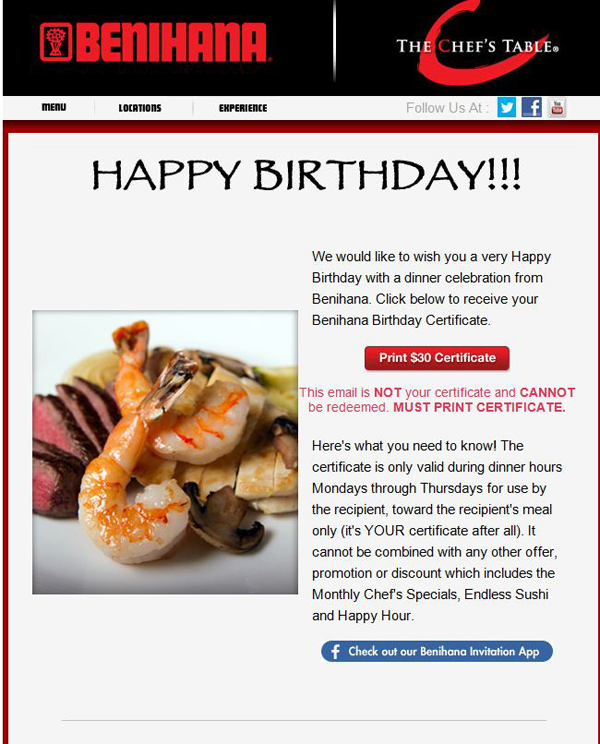
Test Timing
When is the right time to send email campaigns? If you've been around email marketing for any amount of time, you've either been asked this question or tried to provide the answer to this query. Experian's recently released International Holiday Email Performance Study reports that this question has even greater importance during the holiday season because changing the day or even the hour of a campaign can have a significant bottom-line impact due to the high volume of email in subscribers' inboxes. Experian highly recommends that all brands properly test timing options to determine the best approach for their own brand, customers, products and services. One of the first tests Experian suggests that brands consider running is a weekday versus weekend test to see if their holiday emails perform better during the week or on the weekend. There are a few holidays between now and Christmas, and while they are not traditional gift-giving holidays, they could provide insight into when your holiday emails will be most effective.
Here is a sample 4th of July email from NBCUniversal. (Email subject line: 4th of July Sale - 20% off Store-wide!)
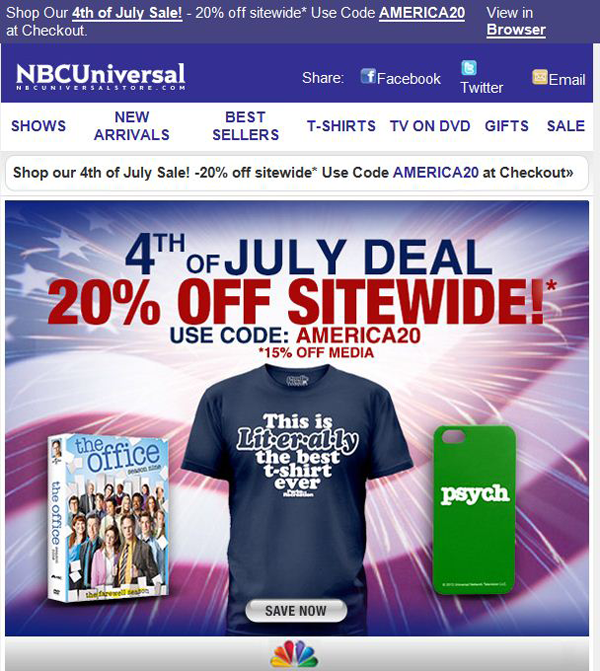
Know Your Score
The Email Sender and Provider Coalition reports that 69 percent of email recipients make the decision to report emails as Spam based solely on the subject lines. To prevent deliverability issues, merchants should use a tool, such as Return Path's Spam Checker, to determine spam ratings and adjust the subject line or email content based on that rating. Many email marketing solutions offer this feature, such as Stream Send.
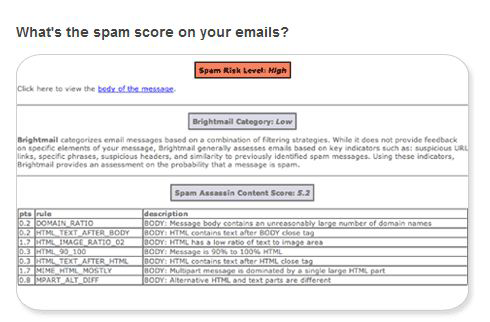
Build Your List
There are simple (and sometimes free) ways to grow an email list before the holiday season. Listrak is a big believer in modal acquisition. It has seen lists increase up to 30 times with this solution. Modal acquisition works when a popup window appears on a website inviting a user to subscribe to your email list. Once they enter their email address or close the window, the window disappears. Listrak client, Kiyonna, acquired several hundred subscribers the first week after launching its modal pop-up (see image below). Internet retailers who are looking to build their lists should also know to make it as easy as possible for users to subscribe. In other words, remove any barriers of entry.
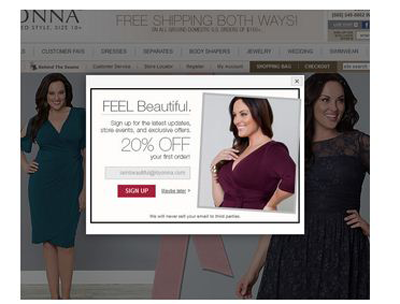
Get Personal
Experian tells us that across all countries, email marketing is evolving to become more relevant to recipients, which is evident through the increased use of data to personalize the customer experience. Personalization can mean a variety of things for different companies, but popular personalization tactics include names in the email subject line (like Benihana did for this editor's birthday email) or location, among other items. For example, kmart used this editor's location to send a weather-based email. By becoming relevant to subscribers, merchants increase the likeliness of earning a consumers trust (and wallet share) in the busy months ahead.
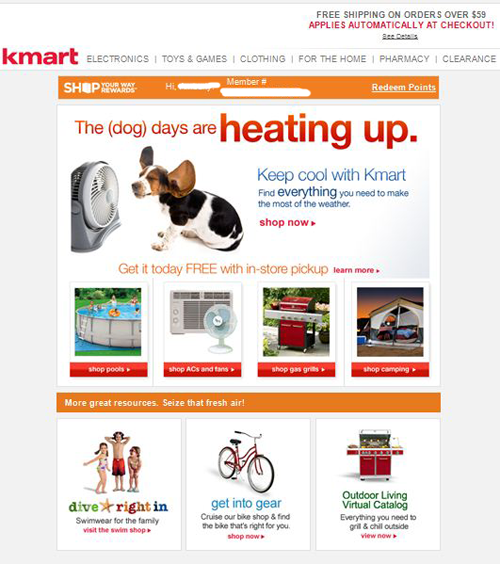
Be Trigger Happy
Despite its adoption by savvy marketers, consumers do not overwhelmingly expect retargeting messages. This may be the reason that emails like abandoned shopping cart messages trigger such a high engagement rate. Experian reports the U.S. has the highest open rate (39.8 percent) for these types of email campaigns, which marketers (using many of the popular email marketing solutions) can set and forget. Merchants may want to begin their abandoned cart messages with a small part of their list now, so it is perfected for events like Thanksgiving, Black Friday, Cyber Monday and Christmas. Here's the example Experian provides of an abandoned shopping cart reminder (subject line: Don't forget...):
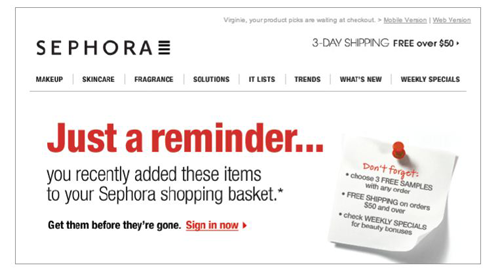
Provide Inbox Actions
Google recently announced its quick action buttons in Gmail, which enables marketers to reach customers without them even opening emails. These buttons appear next to certain messages in a user's inbox and lets them take action without ever having to open the email. These quick action buttons have the possibility of increasing engagement metrics dramatically this holiday season. Merchants should begin experimenting with this new feature immediately. Examples include: leave reviews, make reservations or retrieve promo codes.
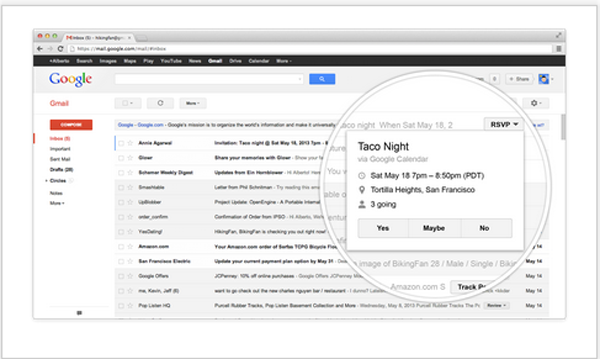
Cross Channels
Mobile and tablet commerce is huge and its impact on email is no different. Even so, Yesmail reports that 76 percent of companies only have a basic mobile strategy if at all. This puts consumers in a tailspin, as 44 percent of consumers say mobile emails are difficult to read because of excessive scrolling. So, as merchants prepare for the holiday season, they should immediately assess their email design to ensure it's scalable or responsive. Not sure what that means? Check out Yesmail's scalable vs. responsive email design infographic.
Read!
Clearly there's a lot to be done before traffic spikes in October, November and December and not everything that should be on your personal checklist is included in this article. For instance, we didn't touch base on the power of analytics (e.g. tracking bounces, forwards, open, replies, etc.) or get more involved in email rendering issues or discuss email surveys.
So, to follow up with the many best practices, emerging technology and news, we suggest bookmarking (and visiting often) Website Magazine's Email Channel to get the most out of your email marketing efforts.










